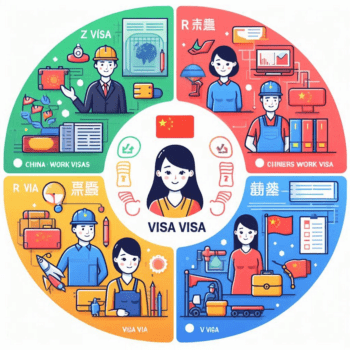
Navigating China’s work visa system can be challenging, especially with recent policy changes.
Having gone through this process myself, I’ll share both personal insights and up-to-date official information to help you understand your options.
Overview of Chinese Work Visa Categories
China has developed a sophisticated system of work visas tailored to different professional backgrounds and purposes. Here’s a comprehensive breakdown:
| Visa Type | Full Name | Suitable For | Duration | Key Requirements |
|---|---|---|---|---|
| Z Visa | Work Visa | General foreign workers | Entry only; converts to residence permit | Work permit, invitation letter, physical examination |
| R Visa | Talent Visa | High-level professionals | Entry only; converts to residence permit | Qualification certification, proof of expertise |
| M Visa | Business Visa | Business visitors (non-employment) | 30-180 days | Business invitation, company documents |
| F Visa | Visit Visa | Non-commercial exchanges, research | 30-180 days | Invitation letter from Chinese organization |
| S Visa | Family Visit | Family members of Z/R visa holders | Typically 1 year | Proof of relationship, invitation letter |
Z Visa: The Standard Work Visa
The Z Visa is China’s primary work visa category.
It’s a single-entry visa that serves as your entry document, after which you’ll convert it to a residence permit.
Application Process:
- Work Permit Notification: Your Chinese employer must first obtain this
- Z Visa Application: Submit at Chinese embassy/consulate in your home country
- Enter China: Within the validity period of your Z visa
- Convert to Residence Permit: Within 30 days of arrival through the local Public Security Bureau
Required Documentation:
- Passport (valid for at least 12 months)
- Work permit notification letter
- Physical examination results
- Employment contract
- Visa application form
- Recent passport photos meeting Chinese specifications
According to the National Immigration Administration, processing typically takes 4-10 business days, though this can vary by location.
R Visa: For High-Level Talents
Introduced in 2013 and enhanced in recent years, the R visa targets “foreign high-level talents” that China wishes to attract.
Eligibility:
- Internationally recognized experts in your field
- Specialists in areas where China faces shortages
- High-level researchers, executives, or entrepreneurs
China has implemented a points-based evaluation system.
According to the Ministry of Science and Technology, applicants must score at least 85 points based on factors including education, work experience, salary level, and Chinese language proficiency.
R visa holders enjoy expedited processing, longer validity periods, and sometimes simplified procedures for family members.
M Visa: For Business Activities
The M visa is for those engaging in commercial and trade activities without formal employment in China.
Typical Activities:
- Attending trade fairs
- Business negotiations
- Short-term consulting
- Equipment installation and training
While an M visa allows business activities, performing actual work requires a Z visa.
The line can be blurry, so consult the Chinese Visa Application Service Center for clarification based on your specific activities.
Recent Policy Changes
China has made significant changes to its visa policies since 2020:
Post-Pandemic Adjustments
- Revival of 15-day visa-free transit for eligible nationalities
- Simplified procedures for previous permit holders returning to China
Talent Attraction Initiatives
According to the Shanghai Municipal Government, first-tier cities have introduced specialized channels for tech professionals and entrepreneurs:
| Program | Target Group | Benefits | Implementing Regions |
|---|---|---|---|
| Technology Innovation Program | Tech entrepreneurs, researchers | Fast-track processing, 5-year permits | Shanghai, Beijing, Shenzhen |
| Foreign Expert Work Permit | Senior professionals, professors | Simplified documentation, family benefits | Nationwide |
| Entrepreneurship Visa Program | Startup founders with funding | Pathway to permanent residency | Select innovation zones |
Regional Implementation Differences
China’s visa policies are implemented with significant regional variation:
- First-Tier Cities (Beijing, Shanghai, Guangzhou, Shenzhen): More efficient processing, English services, specialized talent channels
- Second-Tier Cities: Growing international services but potentially longer processing times
- Developing Regions: May offer incentives to attract foreign talent but with more complex procedures
According to a 2023 report by the European Union Chamber of Commerce in China, processing times can vary from 7 days in Shanghai to 20+ days in smaller cities.
Common Challenges and Solutions
Language Barrier
- Solution: Use official translation services or certified translators for documents
- Many PSB offices now offer English language services
Documentation Complexity
- Solution: Create a document checklist with your employer before beginning
Regional Inconsistencies
- Solution: Always confirm requirements with local authorities
- Consider using registered visa agents for complex cases
Personal Experience
When I arrived in Shanghai in 2021, I discovered that requirements had changed from what was listed online.
The local PSB required additional notarization of my degree that wasn’t mentioned in the national guidelines.
This taught me an important lesson: always double-check requirements with local authorities.
Conclusion
China’s work visa system continues to evolve, with increasing specialization based on talent categories and regional priorities.
While the process can be complex, proper preparation and understanding the latest requirements will smooth your path.
For the most current information, always refer to the Chinese Embassy in your country and consult with your Chinese employer who will be familiar with local implementation.


